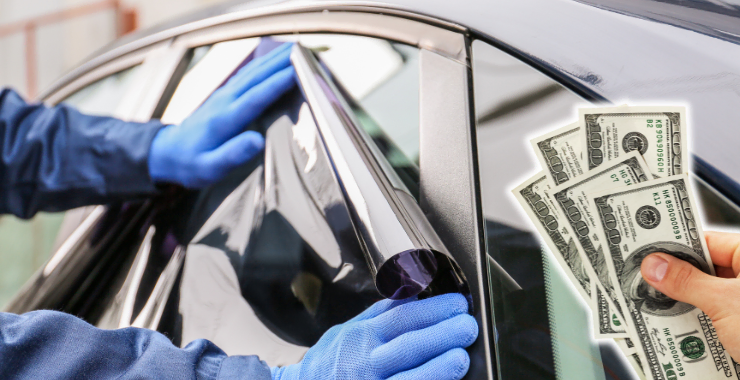Adding window tint to your car can provide many benefits like privacy, UV ray protection, glare reduction, and an upgraded style. But before deciding to tint your car windows, it’s important to understand the associated costs. Prices can vary quite a bit depending on the type of tint, number of windows, vehicle make and model, and who does the installation.
Factors That Affect Car Window Tinting Cost
Several key factors play a role in what you’ll pay to tint the windows on your car:
- Type of tint film: Options like dyed, metallic, hybrid, ceramic, and crystalline tint range dramatically in price.
- Number of windows being tinted: More windows equals higher cost.
- Size and shape of your windows: Compact cars have smaller windows than SUVs and trucks.
- Vehicle make and model: Luxury cars typically cost more to tint than basic economy cars.
- Warranty coverage: Longer warranty periods increase the price but provide peace of mind.
- UV protection level: Maximum UV protection tint films tend to cost more.
- Replacing existing tint vs. tinting for the first time: Removing old tint adds labor costs.

Average Car Tinting Costs by Vehicle Type
Tinting prices often align with vehicle size and type:
- Sedans: $200 – $450
- Coupes: $120 – $450
- SUVs: $250 – $750
- Trucks: Around $350 on average
- Vans: $250 – $750
Typical Price Ranges for Different Tint Types
The specific film material used makes a major difference in the cost of tinting your car windows. Here is more detail on price ranges for some of the most common types:
| Tint Type | Description | Price Range | Durability | Clarity | Heat/Glare Rejection | UV Blocking |
|---|---|---|---|---|---|---|
| Dyed | Dyed polymer interlayer blocks light | $150 – $400 | 3-5 years (fades) | Decent | Moderate | Good |
| Metallic | Thin metal particles block light/heat | $250 – $550 | 5-7 years | Good | Better than dyed | Very Good |
| Hybrid | Combines metals and dyes | $350 – $700 | 7-10 years | Very Good | Very Good | Near ceramic levels |
| Ceramic | Tiny ceramic particles block rays | $400 – $800 | Lifetime* | Excellent | Excellent | Excellent |
| Crystalline | Rare earth mineral crystals | $500+ | Lifetime* | Best | Maximum | Maximum |
*Lifetime warranties commonly included with ceramic & crystalline films
This table makes it easy to compare durability, performance, clarity, and pricing at a glance. As you move down the tint types, prices increase accordingly based on better heat/glare protection, UV blocking, longevity, warranties, and optical clarity.
DIY Tinting vs. Professional Installation
DIY window tint kits seem like an affordable option, but achieving a flawless installation is difficult for non-professionals. On the other hand, professional tint shops charge more but offer expertise, quality tools, and a controlled environment.
What to Expect with Professional Tinting?
The entire tinting process typically takes 2-4 hours depending on the number of windows and complexity of the job. Your car remains inside the professional tint shop this whole time. Technicians thoroughly clean the windows, cut the tint film to precise sizes, use a solution to allow positioning adjustments during the application and trim any excess film once fully set.
Most shops offer lifetime warranties against bubbling, cracking, or peeling when their films are professionally installed. To learn more, check out this comprehensive guide on how long it takes to tint a car.
Benefits of Professional Tint Shops
Expertise: Professional tint technicians install window film on multiple vehicles daily. They have specialized skills, tools, and tricks perfected over the years.
Quality & Warranties: Reputable shops use high-grade tint materials that maintain clarity/durability for years. These films come with manufacturer warranties against defects.
Controlled Setting: Tint shops control variables like cleanliness and sunlight, allowing flawless film application without dust or other issues.
Additional Considerations
A few other things to keep in mind:
- Window tint legality varies by state. Be sure to check the regulations in your area.
- The dark tint may negatively impact resale value, so consider lighter shades if you don’t plan to keep the car for more than a few years.
- Properly maintaining tinted windows with car washes and cleaners helps sustain clarity and appearance over time.
- Combining tint with UV protection film provides an added safeguard against sun damage for maximum benefits.
Tinting Specific Windows
You can also choose to only tint certain windows:
- Windshield tinting is restricted in most states but typically costs $100-150 when legal.
- Rear window tint tends to run $80-150.
- Side window tinting costs around $120-200 per pair.
- Sunroof tinting is $100-250 depending on the size.
Getting the Best Value
To get the most value from tinted windows on your car:
- Ask tint shops detailed questions about their experience, materials, warranties, and what’s included.
- Avoid shops that pressure you or make claims that seem unrealistic. Reputable tint professionals allow you time to make informed decisions.
- Negotiate respectfully for package deals or sales pricing after getting a complete, itemized quote. Most tint shops expect customers to negotiate within reason.
- Realize that while DIY kits seem cheaper, you do “get what you pay for” with professional tinting that lasts longer and provides far better ROI through added comfort, protection, and resale value over time.
Tinting your car windows requires balancing important factors like film type, installation quality, and number of windows to find the right solution at a fair price for your needs. Always research local tint shops’ experience, materials, and pricing. And consider both short and long-term costs and benefits when deciding about adding tint to your car. With reasonable expectations and the right provider, you can enjoy years of benefits from darker, cooler, more private windows.
